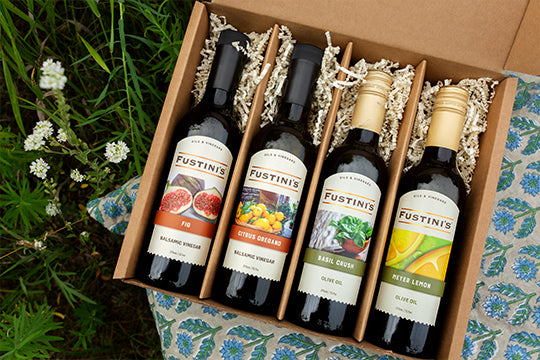Your Guide to Baking with Olive Oil
Coconut flour. Chia seeds. Prune puree. Today’s art of baking has begun to incorporate much more than the simple ingredients of flour, butter and eggs.
With popular health crazes of Whole 30, gluten-free or vegan, rookie and seasoned bakers have discovered new and innovative ingredients to substitute for healthier alternatives. Whether you venture into these new trends out of curiosity or necessity, your creative solutions are endless.
Including flavorful and fruity extra virgin olive oil.
That bottle of extra virgin olive oil sitting on your pantry shelf can revolutionize your favorite baked treat. While often thought of for salad dressings, marinades and sautéing, your EVOO can also be used as a valuable alternative to butter or other fat in your baked recipes.
Sound too good to be true? Here we share some key insights and tips you can use as you explore the fun of baking with extra virgin olive oil.
How Does Baking with EVOO Work?
 In the art of baking, ingredients with different properties are needed in order to turn a bowl of dough into a delicious, light and flavorful bread, cake, cookie, or anything else you throw in the oven.
In the art of baking, ingredients with different properties are needed in order to turn a bowl of dough into a delicious, light and flavorful bread, cake, cookie, or anything else you throw in the oven.
Fat, often through butter or oil, works to tenderize, moisten and allow heat to move through the batter or dough to ensure proper baking. EVOO can easily be substituted for butter in several recipes - in everything from breads to cookies to brownies to pies.
But using extra virgin olive oil in a recipe that calls for butter isn’t quite an equal comparison. When a recipe calls for butter, you’ll want to use ¾ of that amount. For example, if the recipe needs six ounces of butter, use just four ounces of extra virgin olive oil.
Why isn’t it an even swap? Olive oil is 100% while butter is only 80% fat. If you’re swapping regular canola or vegetable oil for extra virgin olive oil, it will be an even substitute.
Quick Tips For Substituting
While this ¾ substitute works for most recipes, there may be times where a little trial and error are required. Usually, if the butter in the recipe is to be melted, the ¾ substitute is just fine. This is also the case if the butter (oil) is creamed with sugar but additional liquid is added in later.
However, when making cookies especially, you may need to use even less oil than that ¾ substitute due to the texture of the dough.
There are select times in which an extra virgin olive oil may not be the best substitute to use. For recipes that require the butter to stay as a solid to accomplish the right texture, such as in making a frosting, using a liquid oil may prove challenging.
Why Use Extra Virgin Olive Oil?
The value of incorporating extra virgin olive oil as a substitute in your baking is mainly twofold. First, you can enhance the overall flavor profile of your recipe, depending on the variety of olive oil you use. Using Blood Orange olive oil amps up the citrus profile of a quick bread recipe. Adding in Butter olive oil as a substitute maintains that rich, buttery flavor in your pie crusts. Even a non-flavored single varietal olive oil carries a unique flavor profile that deepens the complexity of your dish. Because the flavor can be so accentuated in baked goods, it’s important to use high-quality extra virgin olive oil, such as those found at Fustini’s.
A second reason for using extra virgin olive oil in your baked treats is the health benefits that come along. Olive oil has no shortage of benefits for your health and wellness. This monounsaturated fat helps keep your cholesterol in check as well as offering a host of antioxidants that are essential for healthy living. Incorporating a more monounsaturated or polyunsaturated source of fat - rather than just saturated fats. Compared to vegetable oils, EVOO is free from chemicals and other impurities that compromise both the nutrients and flavor of the ingredient.
Great Olive Oils to Get Started With
With so much you can do with extra virgin olive oil, you may be wondering where to get started. To help, here are a few olive oils that do really well in baking.
Blood Orange - This bright and light citrus flavor pairs very well in baked goods, especially when combined with chocolate.
- Substitute in brownie mix instead of vegetable oil
- Elevate the citrus flavor in fruity muffins
- Amp up your pie crusts with a new ingredient
Butter - Get the flavor you love but in a healthier alternative full of antioxidants.
- Perfect for bread recipes that call for melted butter
- Use in pie crusts to substitute that rich, smooth flavor
Single Varietal - Elevate the flavors of your baked treat with a versatile oil.
- Add in Arbequina into this savory focaccia bread
- Use your favorite non-flavored oil in your next loaf of wheat bread
Get To Baking With Extra Virgin Olive Oil
The options for substitutions in baking recipes are seemingly endless. Swap in a delightful ingredient that both amplifies your flavors and is great for your health. So preheat the oven, take out your baking sheet and try a new or favorite recipe today.






